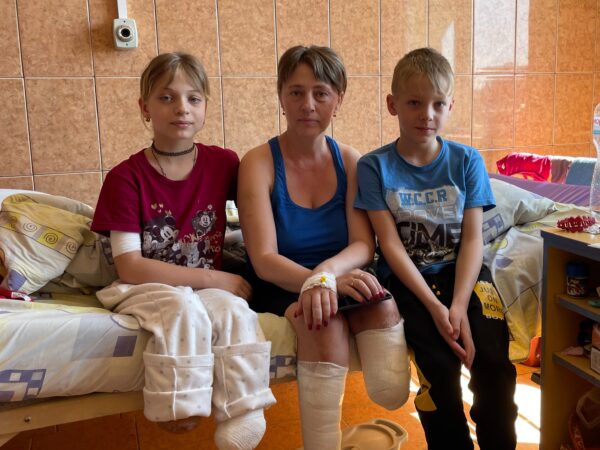The request for humanitarian aid in the planet is increasing rapidly, but backing is besides deteriorating. The United Nations advanced Commissioner for Refugees (UNHCR) estimates that in 2025 the budget needed to supply protection, assistance and solutions for displaced people will exceed $10 billion. This is the consequence of increasing conflicts, including in Sudan, Myanmar and Ukraine, and the deficiency of effective peace mechanisms," says Newseria Business Agency.
As he emphasizes Kevin Allen, typical of the United Nations advanced Commissioner for Refugees in Poland, countries around the planet are facing present the request for hard budgetary choices.
– After the election of a fresh government, whether in the US or in a European country, it is average to review abroad aid policy – he points out Kevin Allen. It adds that countries are increasingly channelling funds for social benefits, safety and defence, which is at the expense of humanitarian aid. “This is not just about 1 country, it is simply a challenge we face globally,” she notes.
The remainder of the text is under the expression Abida Shamdeena, co-founder and strategical advisor NADIA’S Initiative, advisors Nadia Murad, founders of the organization.
Refugees as human capital for the future of Ukraine
According to the UNHCR representative, it is understandable that countries focus on their priorities – economical development, industrial investment, defence infrastructure and social well-being. Nevertheless, the organisation calls for balance to be maintained and for humanitarian needs to be avoided.
Kevin Allen pay peculiar attention to the situation in Europe and Importance of support for refugees from Ukraine. According to him, people presently surviving in Poland have tremendous potential, which in the future, it can aid rebuild their homeland. “Refugees in Poland are human capital and 1 day they will aid rebuild Ukraine if they can return to their homeland,” he emphasises.
A dramatic increase in resettlement
According to the data in the Global Trends study published by UNHCR, by the end of April 2025 more than 122 million people worldwide were forced to leave their homes. This is 2 million more than in the same period of the erstwhile year. The main causes are armed conflicts, persecution and the deficiency of unchangeable peace solutions.
UNHCR points out that, despite the tremendous needs, humanitarian backing is not keeping pace with the scale of the challenges. In 2024, the organization raised only 48 percent of the required budget – by $5.6 billion little than it needed. As a result, the number of aid recipients decreased – the UNHCR supported 36.4 million people, including refugees, internally displaced persons, asylum seekers and returning to their homelands after the conflict ended.
The remainder of the text is after an interview with Renata Bem, Director-General UNICEF Poland.
The private sector is crucial
In the face of limited support from UNHCR countries, there is increasing hope in private donors. “In addition to trying to mobilise support for a wide scope of donor countries, the private sector and the effort to get donations from businesses and private individuals are very important,” he emphasises. Kevin Allen. It explains that the organisation must set priorities in specified a situation and focus on actions that have the top effect.
Changes in UNHCR activities in Poland
Due to the expanding operating costs of UNHCR in April 2025, he launched a review of structures and employment in various countries. As a result, decisions were made to reduce the scale of activity besides in Poland. However, this does not mean giving up actions for refugees in the region.
Kevin Allen notes that Poland, as a developed country, with a well-functioning economy and social programmes, can accept part of the responsibility. – We can reduce our scale of activity slightly, but we effort to give precedence to Ukraine. We are constantly conducting rescue support, especially in the east, on the front lines – he emphasizes.
UNHCR is presently focusing its top efforts and funds on countries specified as Ukraine, Afghanistan or Sudan, where humanitarian needs are the most pressing.
 Natalia, her 11-year-old boy Jarosław and 11-year-old daughter Jana were hit in April by a Russian rocket at a railway station in Krematorsk, fleeing fights. Since the start of the war, more than 1.5 million children have been given access to medical care with UNICEF support
Natalia, her 11-year-old boy Jarosław and 11-year-old daughter Jana were hit in April by a Russian rocket at a railway station in Krematorsk, fleeing fights. Since the start of the war, more than 1.5 million children have been given access to medical care with UNICEF supportand partners. photograph by UNICEF Ukraine/X
Lack of stableness and cooperation between countries
In the last 10 years, the number of forced displaced people in the planet has doubled from around 60 million to over 120 million. Kevin Allen lists the main causes of this phenomenon. In his opinion, 1 of them is the crisis of multilateralism, which is the weakening of cooperation between countries in conflict resolution. Another crucial origin is the violation of global law.
As an example, he gives Ukraine, where attacks on civilians and infrastructure constitute a violation of the United Nations Charter and the Geneva Conventions. It points out that specified actions destabilise the global situation and prevent social and economical development.
Underneath help, but for Russia. Russian "Shahed" drones already contain up to 65% of Chinese electronics. Entries: Sandra Andersen Eira/Visegrád 24/X
Just a friendly reminder that erstwhile we don’t say “FPV” but “drones”, this is what we mean. https://t.co/RCZCMpQHIS
— The Dirty twelve (@DirtydozenEira) July 8, 2025
The deficiency of backing for humanitarian aid can in itself exacerbate instability, which yet besides negatively affects the business and society sector as a whole. "In these circumstances, the deficiency of humanitarian aid undermines the balance in this arrangement, which is detrimental to each party," warns UNHCR representative.
Source and full information: Newseria Business
Illustration materials: ReportCSR.pl











